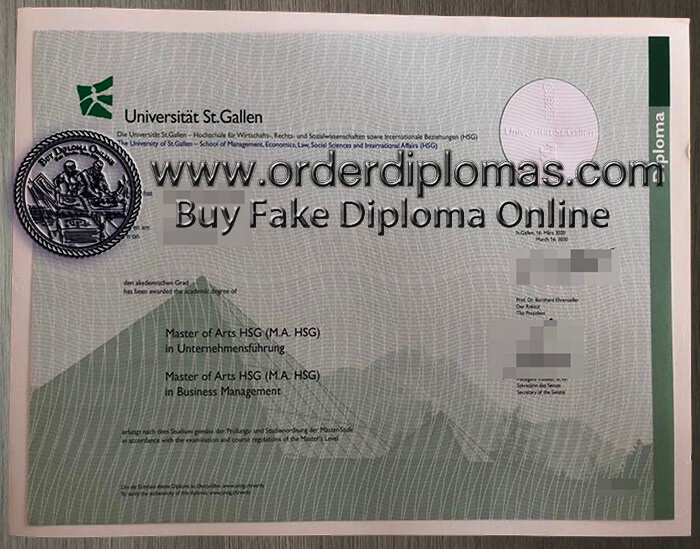
buy fake universitat st. gallen degree
How to buy fake universitat st. gallen diploma? how to buy fake universitat st. gallen degree? how to buy fake universitat st. gallen certificate? buy fake universitat st. gallen diploma, buy fake universitat st. gallen degree, buy fake universitat st. gallen certificate, buy fake diploma, buy fake degree, buy fake certificate, make fake diploma, order fake diploma.
The University of St. Gallen (HSG) is an elite public research university located in St. Gallen, Switzerland that specialises in business administration, economics, law, and international affairs. Established in 1898, it consistently ranks among the best business schools in the world and counts as the top one in the German speaking world. In 2020, it had 9,047 students, of which 3,443 were master’s students and 617 doctoral students.
Although one of Switzerland’s smallest universities, HSG has Switzerland’s largest faculty for business administration. It is a member of the CEMS and APSIA and is EQUIS, AACSB and AMBA accredited (triple crown). Its campus is listed as a Swiss heritage site of national significance.
19th and 20th centuries
In May 1898, the Cantonal Parliament of St. Gallen established an academy for trade, commerce and administration in St. Gallen. The actual founding father is considered to be Theodor Curti, then the head of the Department of Economic Affairs of the Canton of St. Gallen. The business academy commenced lectures in 1899, making it one of the first institutions of its kind in the world. From 1911 on, the name Handels-Hochschule was used. In 1938, the former foundation under private law became a public institution, and in 1939 gained the right to award doctoral degrees.
The University of St. Gallen in 1963, with art works by Antoni Tàpies
In 1963, the university moved to new buildings and changed its name to Hochschule für Wirtschafts- und Sozialwissenschaften. The new buildings were planned for 900 students, but by the winter term of 1963/64, more than 1150 students were enrolled. With the enaction of the Higher Education Act of 1989, the university was renamed Hochschule St. Gallen für Wirtschafts-, Rechts- und Sozialwissenschaften to reflect its curricula. The university has had its own law department since 1978. In 1989, the library building opened, and enrollment had grown to over 3900. In February 1994, the Cantonal Parliament of St. Gallen approved a bill to amend the Higher Education Act, leading to the renaming of the institution as Universität St. Gallen (University of St. Gallen). The acronym HSG remained.
Recent history
In winter 2001/02, the University of St. Gallen started the reorganization of its study programs. Education was classified into bachelor’s and master’s degrees, making the university Switzerland’s pioneer in the Bologna process. In October 2005, the university’s Executive School of Management, Technology and Law (ES-HSG) was opened. The financially autonomous Executive School centralizes further educational activities such as MBA and executive MBA programs.
Mid-2005, the people of St. Gallen voted (with 66.4% in favour) to renovate, reorganize and expand the university by 2011. With a budget of about 80m Swiss francs, buildings from the 1960s were renovated, and its infrastructure was updated.
Following a restructuring in 2011, there are five schools at the University of St. Gallen: the School of Management (SoM-HSG), the School of Finance (SoF-HSG), the Law School (LS-HSG), the School of Economics and Political Science (SEPS-HSG), and the School of Humanities and Social Sciences (SHSS-HSG). Study programs are typically associated with a specific school but are taught jointly by faculty members from several schools. The Executive School of Management, Technology and Law (ES-HSG) plays a special role which has the status of an Institut mit besonderen gesamtuniversitären Aufgaben and which runs the MBA and executive education programs.
The crystallization points of research at the University of St. Gallen are about 40 institutes and research centres, which are an integral part of the university. The directors of the institutes double as professors of the University of St. Gallen. Bringing theory and practice together, the institutes provide an important input for teaching at the University and play a significant role in furthering the careers of young academics. 80 tenured professors, 60 assistant professors and senior lecturers, and more than 300 lecturers and 300 assistants, plus distinguished visiting professors cultivate the scientific discourse with the students.

 USA Diplomas
USA Diplomas Canada Diplomas
Canada Diplomas UK Diplomas
UK Diplomas Australia Diplomas
Australia Diplomas Germany Diplomas
Germany Diplomas Malaysia Diplomas
Malaysia Diplomas Singapore Diplomas
Singapore Diplomas Other countries
Other countries Transcript-Form.xlsx
Transcript-Form.xlsx
